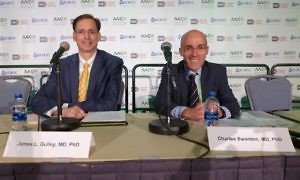What can genomics and tumours teach us about cancer drug development?
Non-small cell lung cancer (NSCLC) is big news this morning with the announcement from Genentech/Roche that the IMpower150 trial exploring whether adding atezolizumab to the standard of care Avastin plus chemotherapy hit it’s first co-primary endpoint of PFS. The data will be presented at European Society for Medical Oncology (ESMO) Immuno Oncology Congress in Geneva, Switzerland next month. The other co-primary endpoint, overall survival, is expected in a couple of months.
I’m delighted that this trial hit a positive note, especially after a few folks were surprised at our emphatic positive prediction for both the PFS and OS outcomes in reviews this year when we looked at it in the summer and again in the fall – see: predictions in 1L NSCLC trials followed by red and green flags.
In the meantime, recently there was some very important news in the lung cancer niche relating to the field of genomics and our understanding of how tumours develop and evolve.
It’s easy for many folks to forget that even in a tumour type that is considered to be a hot/inflamed one due to the high tumour mutation burden (TMB), not all patients respond to checkpoint therapy upfront and not all will achieve lasting durable responses that go out five years. Resistance (primary and acquired), as well as immune escape, will inevitably have a large impact on many patients.
Understanding the underlying biology of the disease will not only help us figure out the causes of non-response and relapse, but also explore rational combination approaches that might improve outcomes.
Just as the triplet of atezo/bevacizumab/chemo has now been show to be superior to the control doublet, we may well see other approaches evolve in the near to medium term future.

The Dynamic Duo at #TARGETS17
Up on deck today is a timely yet rare joint interview that explores the science behind how cancers (including lung cancers) evolve and adapt to try and evade not only detection, but also being destroyed, by anti-cancer therapeutics.
Professor Charles Swanton (Crick and UCL) and Dr James Gulley (NCI) make for a thoughtful and compelling double act.
It was an absolute delight and a privilege to conduct our latest BSB fireside chat with them together. What they had to say was fascinating.
Often we have jested about putting researchers in the BSB hotseat, but frankly when it comes to people of this calibre, the tables are usually turned and the interviewer is the one in the hotseat with some selective pressure to keep up and maintain a flow of intelligent questions!
To learn more insights on ongoing conference coverage, subscribers can log-in or you can click to gain access to BSB Premium Content.
This content is restricted to subscribers